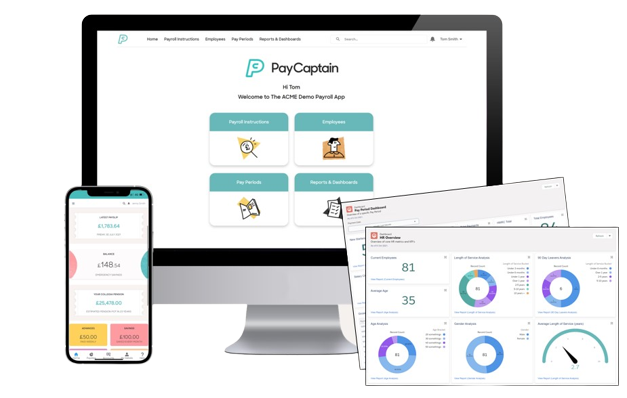The Chartered Institute of Payroll Professionals (‘CIPP’) is the leading professional association for individuals working within the payroll industry in the UK.
Founded with the purpose of promoting payroll as a recognised profession, the CIPP plays a pivotal role in advancing the field through education, training, industry advocacy and payroll qualifications. Its primary mission is to ensure that payroll professionals possess the knowledge, skills and payroll qualifications required to navigate the intricate landscape of payroll, taxation and employment legislation.
With payroll regulations and compliance requirements continually evolving, the role of a payroll professional has never been more important. Accurate and efficient payroll processing is essential for employee satisfaction as well as for ensuring a company’s adherence to its legal and financial obligations.
To meet these demands and stay at the forefront of the industry, it’s essential for every payroll software company to have trained and qualified personnel. Having employees who possess payroll qualifications from the CIPP significantly enhances a company's capabilities, knowledge and credibility. The CIPP's training is recognised as the best payroll qualification in the UK.
The CIPP is committed to fostering excellence within the payroll industry by providing comprehensive training, networking opportunities and access to the latest industry insights. It acts as a central hub for professionals to develop their expertise and stay informed about the ever-changing regulatory landscape.
What are the CIPP’s membership levels?
The CIPP fosters a community of expertise and knowledge-sharing. As an institute dedicated to advancing payroll as a recognised profession, the CIPP offers a tiered membership structure that caters to professionals at various stages of their careers. The seven levels of membership are:
1. Affiliate:
Affiliate Membership is designed for individuals who may not directly work in the payroll profession but have an interest in supporting and contributing to the industry. This category includes vendors, consultants and other professionals who collaborate with payroll experts.
Affiliate members can engage with the CIPP community, access resources and stay informed about industry developments.
2. PMI Affiliate:
The PMI Affiliate level of membership is the entry-level membership of the CIPP created specifically for professionals who work in both payroll and pensions. PMI Affiliate members can engage with the CIPP community, access resources and stay informed about industry developments. Discount on CIPP training courses is available for PMI Affiliates as well as access to the CIPP Advisory Service and other benefits.
3. Associate Student:
Associate Student membership is the mandatory for students who are studying the Foundation Degree programmes. Students can access all the benefits of an Associate member for a reduced fee. This offers students invaluable access to information and resources while they study. Associate student membership is optional for those studying the Payroll Technician Certificate or the Certificate in Pensions Administration.
4. Associate:
Associate Membership is the starting point for those embarking on their journey within the payroll profession.
This level is ideal for individuals who are new to the field or seeking to develop a strong understanding of payroll fundamentals. To become an Associate Member, candidates must meet specific educational requirements and demonstrate their commitment to the payroll industry.
Aspiring members can enhance their skills through CIPP-endorsed courses and workshops, allowing them to build a solid foundation of knowledge.
5. Full:
Full Membership is the next step for payroll professionals. To attain this level, individuals must have management experience or be qualified to level five in payroll, pensions or reward.
Full Member status signifies a commitment to ongoing professional development, as members must complete a specific number of Continuing Professional Development ('CPD') hours each year. This ongoing training ensures that their expertise remains current and aligned with industry trends and changes.
6. Fellow:
Fellow status is a mark of distinction within the CIPP and is awarded to those with a CIPP level 6 or 7 qualification, or at least two years of full membership prior. Fellows must demonstrate evidence of their contribution to the enhancement and advancement of the CIPP and the payroll profession. They must have a wealth of experience, hold significant leadership roles and actively engage in advancing the payroll industry.
Fellow members continue are lifelong learners, staying at the forefront of industry developments and sharing their knowledge through mentoring and advocacy.
7. Chartered:
Chartered Membership is the pinnacle of professionalism within the CIPP.
Holders of this level of membership are recognised for their mastery of payroll knowledge, experience and leadership.
To achieve Chartered Membership, individuals must provide evidence of their comprehensive expertise in strategic, budget, project management or directorship as well as ongoing professional development. Once again, this level represents a commitment to continuous learning and the highest standards of practice, positioning Chartered Members as role models and industry influencers.
What are the benefits of CIPP payroll qualifications?
Staying up to date with the latest legislation and best practices along with keep payroll qualifications current is of paramount importance for payroll professionals and critical for those employed by outsourced payroll companies. The payroll industry is subject to frequent changes in employment laws and payroll reporting requirements, making it imperative for payroll professionals to possess a strong foundation of knowledge.
CIPP payroll qualifications provide payroll professionals with a structured learning pathway that ensures they’re equipped to handle complex payroll scenarios.
The rigorous curriculum covers a wide range of topics, including tax compliance, pension schemes and employee benefits. By obtaining a CIPP payroll qualification, payroll professionals demonstrate their commitment to maintaining high standards and delivering accurate, compliant and efficient payroll services.
A payroll company with employees who hold qualifications from the CIPP gains a distinct advantage over its competitors. Clients and partners are reassured by the presence of certified professionals who have a comprehensive understanding of payroll intricacies. The CIPP's rigorous certification process serves as a marker of expertise, instilling confidence in the company's ability to handle the most complex payroll challenges.
Having CIPP-trained employees also enhances the company's credibility within the industry. Prospective clients are more likely to choose a payroll provider that can demonstrate a commitment to excellence through its team's qualifications, industry association memberships and CIPP awards.
What are the requirements for renewing CIPP memberships?
The CIPP places a strong emphasis on lifelong learning and professional development, ensuring that its members remain at the forefront of the payroll industry. Renewing members are expected to demonstrate:
1. CPD Hours:
Members are required to accumulate a certain number of CPD hours each year, dependent on their level of membership. This involves participating in workshops, courses, seminars and other professional development activities.
CPD hours ensure that members stay informed about the latest legislative changes, technological advancements and best practices.
2. Continual Learning:
Members must demonstrate a commitment to continual learning and self-improvement. This may involve pursuing advanced payroll qualifications, take payroll qualifications online, attending industry conferences or staying updated on relevant publications.
3. Engagement:
Members are encouraged to actively engage with the CIPP community by participating in forums, discussion groups and networking events.This fosters knowledge-sharing and collaboration among professionals.
4. Contribution:
Members are encouraged to contribute to the payroll profession by mentoring junior professionals, volunteering for CIPP initiatives or sharing their expertise through articles, presentations or speaking engagements.
In a time where payroll professionals must navigate intricate regulations, having employees with qualifications from the Chartered Institute of Payroll Professionals is a strategic advantage. These qualifications not only keep employees informed and up to date but also contribute to a company's credibility and clients' confidence.
Not only does the CIPP offer training and support for its members through its website, but it also holds an annual conference where members can meet, collaborate, network, learn about upcoming legislative changes and trends whilst celebrating the payroll profession.
Delegates can attend sessions to learn and get updated on key issues as well as celebrating the importance and excellence of those within the payroll industry.
The 2024 CIPP Annual Conference takes place on the 2nd and 3rd October. It's the largest UK payroll conference and exhibition and takes place at Celtic Manor in Wales. Delegates are able to attend 6 plenary sessions and up to 5 workshop sessions to keep their training up to date, as well as attend the CIPP Annual Excellence Awards 2024, where, in 2022, PayCaptain was recognised as the Software Product of the Year. PayCaptain has been nominated in two categories for 2024 - Software Product of the Year 2024 and Software Project of the Year 2024.
How does PayCaptain support professional development and UK payroll qualifications?
Demonstrating commitment to employees’ professional development, training and quality standards, PayCaptain actively encourages employees to become members of the CIPP. To support this professional development, career progression and as an investment in it’s people, PayCaptain pays the annual membership costs of all employees who are members.
Says Simon Bocca, Founder and CEO of PayCaptain:
“CIPP membership provides our team with access to industry publications, research, best practice guides and webinars. This knowledge helps PayCaptain's employees stay up to date on the latest payroll regulations, changes and industry trends. As a result, they can apply this knowledge to ensure accurate payroll processing, compliance and informed decision-making to deliver the highest levels of service to our customers.”
Payroll specialist, Wiktoria Lis MCIPP Dip, is the newest member of the team to become a full member of the CIPP. With over six years’ experience in the payroll industry, Wiki has successfully completed both the CIPP Payroll Technician certificate training as well as the CIPP Payroll Foundation Degree. She says:
“Being a full member of the CIPP has helped me enhance my payroll career and provide excellent opportunities. Throughout my study, which started with the Payroll Technician course and then onto my Foundation Degree, the CIPP has allowed me to gain new skills and gain a greater understanding of the payroll world. It's helped me go beyond just processing payroll - and has helped me look at the bigger picture.”
She says that being a member of the CIPP has helped her in her role with PayCaptain, by giving her the training and knowledge to successfully evaluate situations and find solutions backed up by theory.
“CIPP allows me and others to keep up with legislative changes and seek advice around payroll processing, enabling us to provide an accurate and highly efficient service within PayCaptain.”
In summary, by investing in the professional development of their workforce through the CIPP's comprehensive training programs and CIPP payroll qualifications, payroll companies position themselves as industry leaders committed to delivering accurate, compliant and efficient payroll solutions.
Training provided by the CIPP means payroll professionals can stay abreast of new trends, upcoming regulatory changes and best practices. As the payroll landscape continues to evolve, those armed with CIPP payroll qualifications are poised to shape the future of payroll with confidence and expertise.















